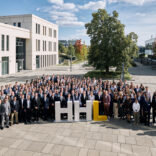60% of Municipalities in Eastern Germany Expect Repercussions from the Pandemic
Student Project by HHL and VNG – Verbundnetz-Gas
A total of 83 percent of the municipalities in former East Germany foresee lower tax revenue due to the coronavirus crisis; 61 percent expect the aftereffects to last for years. This is the result of a student project conducted by HHL Leipzig Graduate School of Management in collaboration with the Leipzig-based energy company VNG AG.
For the survey, in-depth interviews were conducted with mayors and high-ranking officials from 36 municipalities with a maximum of 60,000 inhabitants from the Eastern German federal states. The study aimed to record the challenges for the municipalities and to derive measures for the future.
Investments halted in Eastern Germany due to pandemic
More than one in four (28 percent) of respondents stated that investments had been halted or pushed back because of the pandemic. A total of 72 percent classified their financial situation as difficult even without the coronavirus crisis. Almost half of the respondents (47 percent) considered demographic change and migration to be challenging. “
The per-capita income in Eastern Germany is 33 percent lower than in municipalities in Western Germany,” explained Prof. Dr. Erik Maier from HHL Leipzig Graduate School of Management, who led the project. “A further issue is the population drain which many municipalities are experiencing. Both of these effects make it difficult for them to deal with the losses caused by the coronavirus crisis.”
More than one in three of the interviewed mayors and community leaders see accelerated digitalization as a positive effect from the crisis.
Digital transformation and investment in education have high priority
More than one in three (39 percent) of the interviewed mayors and community leaders see accelerated digitalization as a positive effect from the crisis. The use of digital communication increased in numerous offices as a result of the coronavirus-related restrictions. It also became apparent how important broadband internet connections are for the municipalities — particularly with regard to offering education and attracting families. For this reason, the promotion of digital transformation in rural areas is seen as vitally necessary.
The majority of municipalities (69 percent) view future investments in the areas of education and childcare as particularly important. Road construction also has a high priority for more than half of the respondents (58 percent). Investments in the energy infrastructure, however, are considered to be less relevant as only 19 percent assign the highest priority to this area.
“It became clear that for many municipalities in Central Germany, investments in digital infrastructure and education are very high up the list while sustainable energy solutions are not necessarily considered to be a priority. The municipalities often have a relatively passive attitude, waiting for specific instructions from the state government or support from the economy and displaying skepticism towards public-private partnerships. The smaller the municipality, the more difficult the situation because of the lack of resources”
Study results help VNG gain more market clarity
“We consider ourselves to be a strong partner of municipalities, especially against the background of the energy turnaround. Therefore, the results are extremely helpful in better assessing the challenges and needs and adjusting the way we support communities,” comments Bodo Rodestock, Member of the VNG Executive Board.
“We were surprised to learn that building and converting infrastructure in the energy sector often plays a subordinate role. We need to raise more awareness because this area requires a lot of effort for us to be able to achieve the climate targets.”
Discovering new perspectives through student projects
Companies interested in conducting a practical project can contact HHL via employer-relations@hhl.de to learn more about partnership opportunities.


